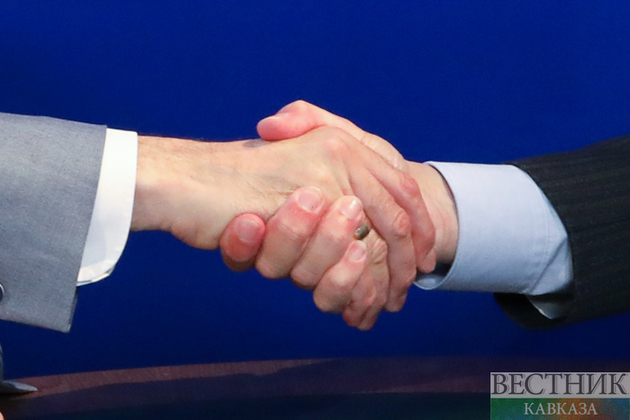Hamas officially announced the resumption of relations with the Syrian government after a decadelong hiatus caused by the 2011 Syrian uprising, raising questions about the gains Hamas might achieve and why Iran sought to mediate the reconciliation.
Al-Monitor report that by the end of 2011, Hamas left its offices in Damascus, after condemning the Syrian government’s violent crackdown on the popular uprising that had broken out earlier that year. At the time, Syrian President Bashar al-Assad accused the movement of supporting Syrian armed groups fighting his government. Hamas began to have a change of heart vis-a-vis the Syrian revolution after having disengaged from the Muslim Brotherhood, redefining itself as Palestinian resistance movement only, in its new political charter that was announced on May 1, 2017.
In its previous charter, Hamas had defined itself as one of the branches of the Muslim Brotherhood in Egypt. A prominent Hamas leader, who asked not to be named, told Al-Monitor that the resumption of relations with Syria “will be followed by the reopening of the movement’s offices in Damascus in the near future.”
He made it clear that the Hamas office in Damascus would not be a substitute for the movement’s main political office in the Qatari capital of Doha, but rather a branch of the movement’s offices located in several countries such as Turkey, Algeria and Beirut.
The leader said that the Damascus office will include second-rank leaders, as opposed to the situation prior to 2011 when top Hamas officials were based in the Syrian capital, which was the base of Khaled Meshaal, Hamas’ head at the time.
The source noted, “Hamas still prefers that its main office remain abroad and that its current head — Ismail Haniyeh — stay in Qatar, due to several political and security considerations, the most important of which is that the world views Qatar as a moderate country, and this serves Hamas.”
“Hamas is looking forward to opening up to the world and building relations with different countries. But the international community views the Syrian government as a repressive regime with the highest records of human rights violations,” the source said.
The source added, “Also, the security situation in Syria remains precarious with the ongoing sporadic Israeli airstrikes on the capital and several Syrian towns, which is another reason for Hamas not to base its top leaders in Damascus.”
The latest round of Israeli airstrikes in Syria was carried out Sept. 17. The Syrian army announced that five soldiers were killed in the airstrike near the Damascus airport.
Ahmed Abdel Rahman, political analyst and member of Islamic Jihad, told Al-Monitor, “Hamas’ statement announcing the resumption of relations with Syria was ready a month ago, but was postponed at the request of the Syrian regime as it wanted to ensure Hamas’ genuine position.”
He added that Iran, Lebanon’s Hezbollah and Islamic Jihad played a role in restoring relations between Hamas and Syria, stressing that Hezbollah had the biggest impact in this regard.
In a speech Sept. 17, Hezbollah leader Hassan Nasrallah said that Hamas’ decision to resume ties with the Assad government was the right thing to do, adding that “Syria, with its people and leadership, will remain the true support of the Palestinian people.”
Ayman al-Rafati, analyst and security and political expert, told Al-Monitor, “Based on my information, there is complete consensus within Hamas to restore ties with Syria. The normalization of relations will be in the interest of both sides. Syria needs Hamas to restore its previous stance and image [prior to 2011] of a country standing by the Palestinians against Israel.”
He said, “Meanwhile, Hamas is seeking to ramp up all efforts to counter the normalization in relations between Arab countries and Israel. Syria is known for its intransigent refusal of any kind of normalization with Israel despite the pressures.”
He explained that “any side that wishes to be part of the axis of resistance rejecting normalized ties with Israel must be on good terms with Syria, which is at the heart of this axis.”
The United Arab Emirates (UAE), Bahrain, Sudan and Morocco reached normalization agreements with Israel in 2020, as part of the so-called Abraham Accords, under the auspices of then-US President Donald Trump.
In a statement issued July 15, Hamas leader Ismail Haniyeh called for building a regional political alliance that would protect the region from normalization with Israel, to confront an Arab-Israeli alliance that the United States is establishing to confront Iran.
Talal Okal, political analyst who writes for Al-Ayyam newspaper, told Al-Monitor, “I do not see that the Assad regime might benefit from resuming its relations with Hamas, which supported the revolution against it. I think what happened was at Iran’s direct instructions to both sides, amid international attempts to curb Tehran’s role in the Arab region.”
He said that Hamas rushed to restore relations with Syria in light of the normalization of several Arab countries with Israel, such as Bahrain, the UAE and Morocco.
Okal concluded, “I think Hamas is left with a few options, and Syria is a major player in the axis of resistance that stands against the normalization that is taking place in the Arab world with Israel.”






